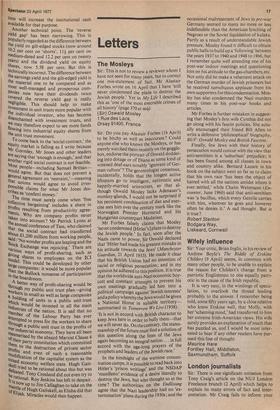Sir: Do you pay Alastair Forbes (16 April) to be
bitchy as well as inaccurate? Could anyone else who knows the Mosleys, or has merely watched them recently on the gogglebox, endorse the portrait of Oswald doddering into dotage or of Diana as some kind of wizened deaf-ears notably 'ignorant of German culture' ? The gerontologist consensus, incidentally, holds that the longest active lifespans go to intelligent, optimistic and happily-married aristocrats, so that although Oswald Mosley lacks Adenauer's monkey-glands, I would not be surprised if his persistent combination of diet and exercise sees him over the century mark like the Norwegian Premier Hornsrud and his Hungarian counterpart Madarasz. Mr Forbes falsely claims that Mosley 'never condemned [Hitler's] plans to destroy the Jewish people.' In fact, soon after the Nazis came to power, Sir Oswald declared that 'Hitler had made his greatest mistake in his attitude towards the Jews' (Manchester Guardian, 21 April 1933). 14e made it clear that his British Union had no intention of racial or religious persecution; and in my opinion he adhered to this position. It is true that the worldwide anti-Nazi economic boycott and constant attempts to prevent his own meetings gradually led him into a political campaign against 'Jewish interests' and a policy whereby the Jews would be given a National Home in suitable territory— summarised in Tomorrow We Live (1938): 'It is not in accord with British character to keep Jews here in order to bully them—that we will never do. On the contrary, the statesmanship of the future must find a solution of this question along the lines of the Jews again becoming an integral nation ... in full accord with the age-long prayers of the prophets and leaders of the Jewish race.'
In the hindsight of the wartime concentration camps, it is possible to read back into Hitler's 'prison writings' and the NSDAP 'manifesto' evidence of a desire literally to destroy the Jews, but who thought so at the time? The authorities on the Endlosung agree that the Nazi leadership had no 'extermination' plans during the 1930s; and the
occasional maltreatment of Jews in pre-war Germany seemed to many no more or less indefensible than the American lynching of Negroes or the Soviet liquidation of kulaks. Partly as a result of understandable Jewish pressure, Mosley found it difficult to obtain public halls to build up a 'following' between the years 1937 to 1940 and 1948 to 1966, but I remember quite well attending one of his post-war indoor meetings and questioning him on his attitude to the gas-chambers, etc. Not only did he make a vehement attack on the German murder of Jewish prisoners but he received tumultuous applause from his own supporters for thiscondemnation. Mosley has also condemned the Nazi murders many times in his post-war books and articles.
Mr Forbes is further mistaken in suggesting that Mosley's first wife Cynthia did not go along with his fascist policies. She actually encouraged their friend Bill Allen to write a defensive 'philosophical' biography, BUF: Oswald Mosley and Brills-It Fascism.
Finally, few Jews with their history of persecution would concur with the view that anti-semitism is a 'suburban' prejudice; it has been found among all classes in town and country alike. Bernard Lazare in his book on the subject went so far as to claim that his own race 'has been the object of hatred with all the nations amidst whom it ever settled,' while Chaim Weizmann (Encounter, June 1960) said that anti-semitism was 'a bacillus, which every Gentile carries with him, wherever he goes and however often he denies it.' A sad thought. But is it true?
Robert Stanton Bodgara Way, Liskeard, Cornwall


































 Previous page
Previous page